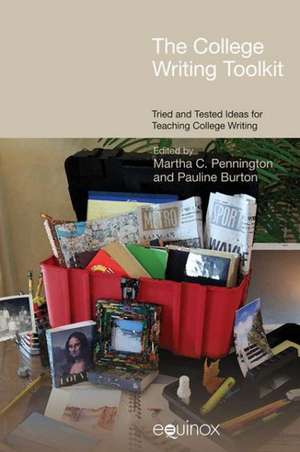The College Writing Toolkit: Frameworks for Writing
Editat de Martha C. Pennington, Pauline Burtonen Limba Engleză Hardback – 31 mai 2011
Din seria Frameworks for Writing
-
 Preț: 248.84 lei
Preț: 248.84 lei - 19%
 Preț: 714.00 lei
Preț: 714.00 lei -
 Preț: 310.83 lei
Preț: 310.83 lei -
 Preț: 355.56 lei
Preț: 355.56 lei -
 Preț: 306.00 lei
Preț: 306.00 lei - 19%
 Preț: 682.16 lei
Preț: 682.16 lei -
 Preț: 268.43 lei
Preț: 268.43 lei -
 Preț: 256.55 lei
Preț: 256.55 lei -
 Preț: 262.70 lei
Preț: 262.70 lei -
 Preț: 256.01 lei
Preț: 256.01 lei - 19%
 Preț: 458.33 lei
Preț: 458.33 lei -
 Preț: 362.95 lei
Preț: 362.95 lei -
 Preț: 228.24 lei
Preț: 228.24 lei -
 Preț: 293.10 lei
Preț: 293.10 lei -
 Preț: 304.10 lei
Preț: 304.10 lei -
 Preț: 277.13 lei
Preț: 277.13 lei - 19%
 Preț: 611.71 lei
Preț: 611.71 lei -
 Preț: 256.24 lei
Preț: 256.24 lei -
 Preț: 303.41 lei
Preț: 303.41 lei - 8%
 Preț: 579.77 lei
Preț: 579.77 lei
Preț: 540.21 lei
Preț vechi: 666.93 lei
-19% Nou
Puncte Express: 810
Preț estimativ în valută:
103.40€ • 107.54$ • 86.65£
103.40€ • 107.54$ • 86.65£
Carte tipărită la comandă
Livrare economică 13-27 martie
Preluare comenzi: 021 569.72.76
Specificații
ISBN-13: 9781845534523
ISBN-10: 1845534522
Pagini: 386
Dimensiuni: 160 x 236 x 28 mm
Greutate: 0.73 kg
Ediția:New.
Editura: Equinox Publishing (Indonesia)
Seria Frameworks for Writing
ISBN-10: 1845534522
Pagini: 386
Dimensiuni: 160 x 236 x 28 mm
Greutate: 0.73 kg
Ediția:New.
Editura: Equinox Publishing (Indonesia)
Seria Frameworks for Writing
Notă biografică
Martha C. Pennington is Professor of Writing and Linguistics at Georgia Southern University and the editor of the journal Writing & Pedagogy. She is the author of The Computer and the Non-Native Writer (Hampton Press) and Writing in an Electronic Medium: Research with Language Learners (Athelstan). She has won awards for educational leadership from the UK as a National Teaching Fellow and from the TOEFL group of the Educational Testing Service (Princeton, New Jersey). Pauline Burton is a Senior Lecturer at the Community College of City University, Hong Kong. She co-edited Bilingual Women: Anthropological Approaches to Second Language Use (Berg) and complements her academic profile with a background in creative writing, acting, and radio performance.
Cuprins
Introduction 1. Tools of the Trade: The College Writing Teacher in a New Age Pauline Burton and Martha C. Pennington Part 1. Writing from Personal Experience 2. The Personal Essay as a Tool to Teach Academic Writing Olivia Archibald, St. Martin's University (USA) 3. Snapshots of Our Literacies Michelle Cox, Bridgewater State College (USA) Katherine E. Tirabassi, Keene State College (USA) 4. Empowering Basic Writers Through This I BelieveA" Essays Molly Hurley Moran, University of Georgia (USA) 5. Local Heroes, Local Voices Pauline Burton 6. A Funny Thing Happened To Me: Introducing Oneself Through Humor Martha C. Pennington Part 2. Argumentation and Writing from Sources 7. The Delayed ThesisA" Essay: Enhancing Rhetorical Sensitivity by Exploring Doubts and Refutations Sara Pace, Lamar University (USA) 8. Literature-with-Exposition: A Critical Thinking and Writing Assignment Gita DasBender, Seton Hall University (USA) 9. Paraphrase Integration Task: Increasing Authenticity of Practice in Using Academic Sources Zuzana TomaA', University of Utah (USA) 10. Teaching Critique Writing: A Scaffolded Approach Nahla Nola Bacha, Lebanese American University (Lebanon) Part 3. Writing for Specific Contexts 11. Academic Discourse Community Mini-Ethnography Dan Melzer (California State University, Sacramento (USA) 12. Using Writing Across the Curriculum Exercises to Teach Critical Thinking and Writing Robert Smart, Quinnipiac University (USA) Suzanne Hudd, Quinnipiac University (USA) Andrew Delohery, Quinnipiac University (USA) 13. Writing the ProfessionalA": A Model for Teaching Project Management in a Writing Course Sky Marsen (Victoria University of Wellington (NZ) 14. Writing for an Authentic Audience Kate Kessler, James Madison University (USA) Part 4. Interactive and Self Assessment of Writing 15. The Write Path: Guiding Writers to Self-Reliance Lisa Nazarenko, University of Vienna (Austria) Gillian Schwarz, University of Vienna (Austria) 16. Conference-based Writing Assessment and Grading Robert T. Koch, Jr., University of North Alabama (USA) Part 5. Working With Technology in the Writing Class 17. Scavenger Hunt: A Model for Digital Composing Processes Sally Chandler, Kean University (USA) Mark Sutton, Kean University (USA) 18. Virtual Mediation: Audio-Enhanced Feedback for Student Writing Carter Winkle, Barry University (USA) 19. Academic Writing in the Foreign Language Class: Wikis and Chats at Work Ana Oskoz, University of Maryland, Baltimore County (USA) Idoia Elola, Texas Tech University (USA)
